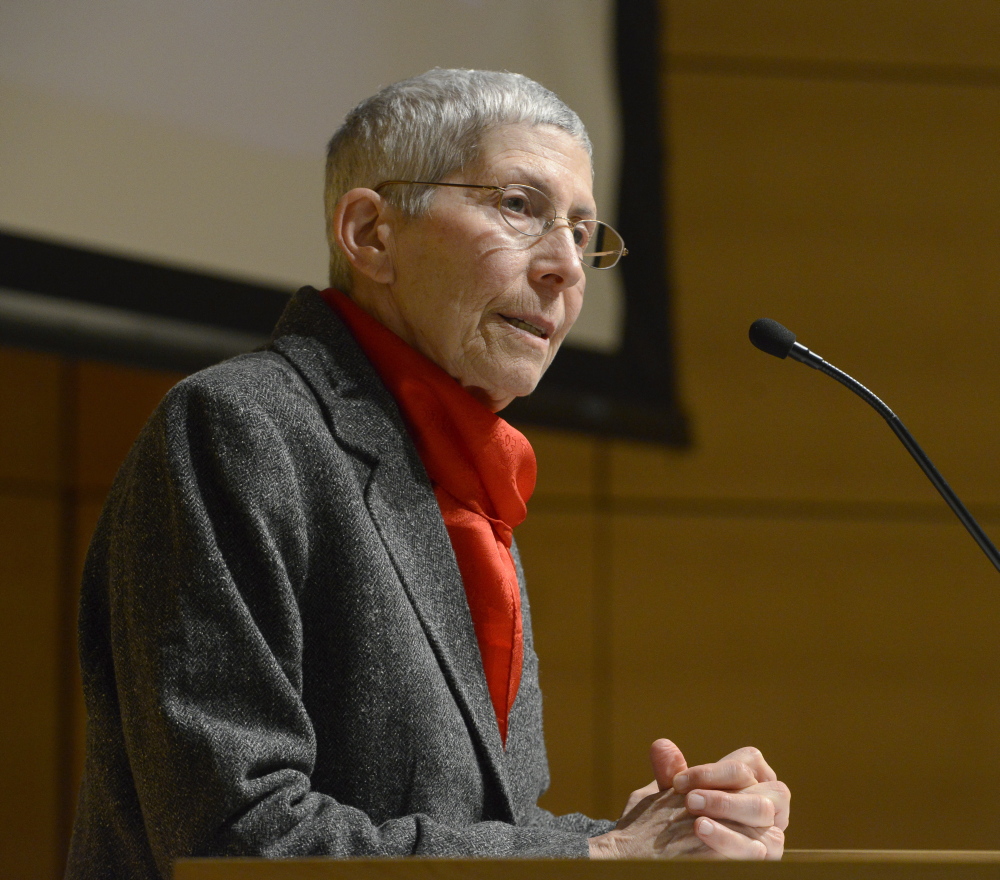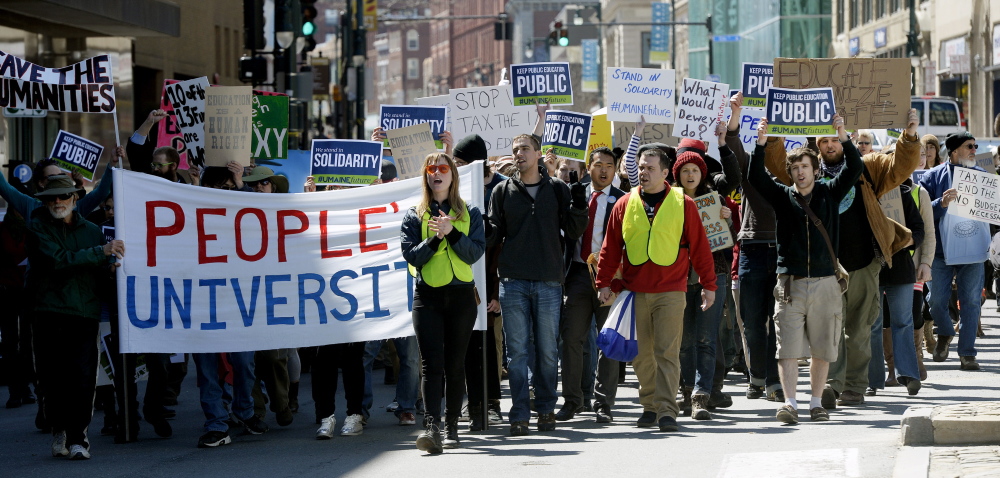LEWISTON — University of Southern Maine President Theodora Kalikow on Friday rescinded the 12 faculty layoffs that had prompted weeks of protests, saying she’s open to alternative plans for finding up to $14 million in cuts.
“Those retrenchment (layoff) notices are off the table for now,” Kalikow said Friday afternoon at the USM Faculty Senate meeting. She said she made up her mind at 2 p.m., just as the meeting began, and didn’t even have time to tell the affected faculty.
The room erupted in applause and backslapping as she revealed the news.
The surprise announcement came as the Faculty Senate unveiled a draft 27-point proposal for alternative cuts and about two dozen students traveled to Augusta to lobby state lawmakers. The students met with members of the Portland delegation and the Legislature’s Education and Cultural Affairs Committee.
Also, the faculty union sent a grievance letter to the administration Thursday challenging the layoffs.
But Kalikow said none of those things played a role in her decision, saying she had been out of state and didn’t know about the union letter and had not read the Faculty Senate proposal. And while she praised the students for their activism, she said that did not play a role in the reversal, either.
Kalikow said she didn’t see herself as “caving” in to pressure, but didn’t say exactly what changed her mind.
“The faculty made a good case that they had possibly better ideas,” she said. “This was a difficult decision, but it’s best for USM for the faculty and administration to be more tightly involved in these crucial decisions.”
The Faculty Senate is due to submit its alternative cuts to Kalikow by May 5, but its plan doesn’t include estimated cost savings so it’s not clear how it would close the budget gap. Faculty members say they expect to have calculated the various proposals’ savings by early next week.
“They have a couple more weeks to give me better alternatives,” Kalikow said. “The long-term goals remain the same.”
Kalikow said the laid-off faculty members are safe at least until October, when another layoff notice could go out.
“It may turn out that they will get fresh letters,” she said, adding, “I have no idea what might happen.”
Kalikow did not reverse the decision to eliminate about 35 staff positions.
“This is a victory for students, for faculty, for Portland, for all of us,” student organizer Marpheen Chann-Berry said. “But there is another victory still to be had – fixing state funding for public universities.”
Last month, USM officials announced the layoffs as part of an effort to cut $14 million from the school’s $140 million budget for the fiscal year that starts July 1. USM’s budget crunch is part of a $36 million funding gap in the University of Maine System caused by flat state funding, declining enrollment and tuition freezes.
The layoffs at USM prompted weeks of protests, including two rallies that drew more than 200 people and an aggressive social media campaign.
Although Kalikow said that didn’t play a role in her decision, several people said it must have been a factor.
“I think what happened today was the result of pressure from students, the letter (from the union) and lots of faculty discontent,” said Mark Lapping, a professor at the Muskie School of Public Policy and a former USM provost.
“I think this could be a new beginning,” Lapping said of the faculty and administration working together. “It’s got to become ‘our’ dilemma, not ‘their’ dilemma. … We’ve got to collectively solve these problems in a transparent and non-coercive environment.”
The students’ actions included drafting emergency state legislation seeking to freeze the cuts and analyze the system’s financial data, publishing several analytical pieces picking apart the fiscal argument for the cuts, and media-messaging that got the attention of New York Times columnist Paul Krugman and philosopher and liberal hero Noam Chomsky.
While the students were keeping up high-profile protests, behind-the-scenes discussions and diplomacy continued between faculty members and administrators.
Luisa Deprez, chairwoman of the sociology department, said Friday that she was part of a four-person team that has been meeting in recent weeks with campus officials and the system chancellor to “lessen the impact of what was initially proposed.”
“There’s no doubt about the fact that this is a dire financial situation,” Deprez said, adding that she felt “relief” at Kalikow’s announcement.
“I feel terrific. I think (Kalikow) offered a message of hope and provided the kind of leadership this university needs,” added Deprez, who has taught at USM for 38 years.
About two weeks ago, Kalikow restored one threatened program – recreation and leisure studies – by folding it into the nursing program.
Still scheduled to be closed are the American and New England studies graduate program, geosciences, and the arts and humanities major at Lewiston-Auburn College, which is part of USM. If those programs are eliminated, seven professors could be laid off.
Budget cuts are happening systemwide. At the flagship campus in Orono, officials cut $10 million from its $249 million budget, mostly by leaving positions vacant and laying off about seven non-faculty employees. University of Maine at Augusta officials announced that they would cut 24 positions, end several degree programs and drop two sports teams.
Chancellor James Page said he supported Kalikow, and that it was her decision to make.
“We’ll all be watching closely what happens,” he said.
“(Page) is in favor of giving the Faculty Senate some chance to have more detailed feedback,” Kalikow said. “Now it is up to them to work with me and for me to work with them.”
One of the dozen laid-off professors was in the audience when Kalikow made the announcement.
“At this point nothing surprises me,” observed associate professor of musicology Paul Christiansen, who said he believes that the grievance letter prompted the decision. “This should have never happened in the first place.”
The alternative cuts proposed by the Faculty Senate include ending the use of outside consultants, eliminating middle-management administrators and consolidating the three campuses of the University of Southern Maine. There is no dollar figure associated with the list of 27 proposals, but Faculty Senate Chairman Jerry LaSala said he believes they can find the same cost savings that were in Kalikow’s proposal.
“We’ve created time to do it right,” LaSala said. “I think making $7 (million) or $8 million (in cuts) is entirely plausible.”
LaSala said members of the Faculty Senate expect to have calculated the possible cost savings and revenue figures by early next week.
“The reason we are working so hard on this is because we, the faculty, are deeply concerned that cuts of this magnitude will hurt enrollment and wind up costing us more money than we save,” LaSala said, noting that several proposals would bring in revenue. “Making money is far more beneficial than cutting. We all agree we can’t cut our way to success.”
“This is our chance to get it right,” said Jeanne Munger, an associate professor in marketing.
The full list of proposed alternate cuts can be read here.
Noel K. Gallagher can be contacted at 791-6387 or at:
Send questions/comments to the editors.




